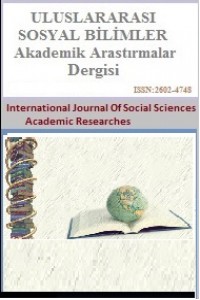THE SIGNS AND COSTS OF THE ELECTION ECONOMY IN THE ELECTIONS TOOK PLACE DURING THE PERIOD OF 2002-2018 IN TURKEY
Öz
The election economy has passed to the
literature of economics as the economic appearance of political structure’s populist
policies. In the period of 2002-2018 12 elections and referendums took place in
Turkey. 5 general elections, 1 presidential election, 3 local elections, and 3
plebiscites were done in sixteen years.
According to the definition of M.Eğilmez
in his article with the title ‘’The Election Economy’’; it can be described as the
government’s using and directing means of the economy for this purpose in order
to come into power again in the next elections. Increases in the wages
of officers, raising pensions and minimum wages, agricultural supports,
decreasing tax rates, remitting tax penalties and delaying tax payments are the
main means of the election economy using fiscal policy.
In every electoral period, treasury
grants given to the political parties and election expenses have increased
public burden significantly.
Anahtar Kelimeler
Kaynakça
- -Aktan, C.C.,(2015), İDEAL DEVLET ve İYİ YÖNETİM : TEMEL İLKELER , KURALLAR veKURUMLAR,Hukuk ve İktisat araştırmalar Dergisi,2015, Cilt 7, Sayı 1, 2015, ISSN: 2146-0817(Online)
- -Eren, Ercan ve Melike Bildirici (1999), “Siyasal Konjonktür Dalgaları ve Türkiye’de SeçmenDavranışları”, İktisat İşletme ve Finans, Sayı 163, ss. 27-39
- -Erkişi,K., Rasyonel Oportünist Seçim Çevrimleri Teorisi Perspektifinde Türkiye’de 2007-2011 Ve2015 Genel Seçimlerinin Analizi,Abant İ.B.Ü.Sos.Bil.Der.,2017,C:17,S:3 (49-72)
- -Onur,S.,(2004),Seçim Ekonomisi,Asil Yay.,Ankara
- -Karaçor,Z.,(2005),Konjonktür Dalgalanmaları Teorileri Çerçevesinde Seçim Ekonomisi,Selçuk Üni.SBE, Y.Lisanas Tezi
- -Paya,M.M.,(2001),Makro İktisat,Filiz Kitabevi,İstanbul
- -Topuzkanamış,E., SİYASİ Partilere Devlet Yardımı,DEU,Hukuk Fak.Dergisi,Cilt:14,S:2
- -http://www.anayasa.gen.tr/2820sk.htm (erişim:05/08/2018)
- -https://www.dogrulukpayi.com/bulten/siyasi-partilere-hazine-yardimi (Erişim: 06/08/2018)
- -http://tuik.gov.tr/UstMenu.do?metod=temelist (Erişim: 06/08/2018)
- -http://www.mahfiegilmez.com/2018/05/secim-ekonomisi.htm,(erişim :08/08/2018)
Ayrıntılar
| Birincil Dil | İngilizce |
|---|---|
| Bölüm | Araştırma Makaleleri |
| Yazarlar | |
| Yayımlanma Tarihi | 25 Mart 2019 |
| Gönderilme Tarihi | 24 Mart 2019 |
| Yayımlandığı Sayı | Yıl 2019 Cilt: 3 Sayı: 1 |
Kaynak Göster
Uluslararası Sosyal Bilimler Akademik Araştırmalar Dergisi / International of Social Sciences Academic Researches


